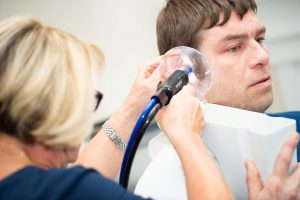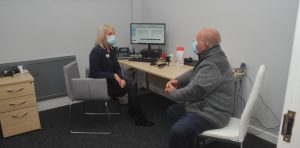The study of 3,103 people with tinnitus was led by Anglia Ruskin University with support from the British Tinnitus Association and the American Tinnitus Association. The study involved participants from 48 countries, with the vast majority coming from the UK and the US.
Published in the journal Frontiers in Public Health, the research found that 40% of those displaying symptoms of COVID-19 simultaneously experience a worsening of their tinnitus.
Although the study focused on people with pre-existing tinnitus, a small number of participants also reported that their condition was initially triggered by developing COVID-19 symptoms, suggesting that tinnitus could be a ‘long COVID’ symptom in some cases.
Tinnitus affects an estimated one in eight adults in the UK and is associated with reduced emotional wellbeing, depression, and anxiety.
The new study also found that a large proportion of people believe their tinnitus is being made worse by social distancing measures introduced to help control the spread of the virus. These measures have led to significant changes to work and lifestyle routines.
UK respondents reported this to be a greater issue compared to people from other countries, with 46% of UK respondents saying that lifestyle changes had negatively impacted their tinnitus compared to 29% in North America.
Internal worries such as fear of catching COVID-19, financial concerns, loneliness and trouble sleeping have contributed to making tinnitus more bothersome for 32% of people overall, with external factors such as increased videocalls, noisier home environments, home schooling and increased coffee and alcohol consumption also cited by respondents. Females and the under-50s have found tinnitus significantly more bothersome during the pandemic.
The study noted that as well as increasing the severity of tinnitus symptoms, the COVID-19 pandemic has also made it more difficult for people to access healthcare support for the condition. This could further increase emotional distress and worsen tinnitus symptoms, creating a vicious cycle. Before COVID-19, more than eight out of 10 UK patients were already unhappy with the treatment options available from their health professional.
David Stockdale, Chief Executive of the British Tinnitus Association and a co-author of the study, said: “With the second wave of of Covid-19 and the resulting national lockdown likely to increase feelings of stress and isolation, it’s vital that we don’t see the same mistakes as before when it comes to community health provision for people with tinnitus.
“Poor treatment of tinnitus in the early stages often leads to much worse cases and severe tinnitus can have a huge impact on mental health. With this in mind, as the COVID-19 second wave takes hold, the healthcare system needs to ensure that anyone who develops tinnitus or experiences a worsening of their condition can access the professional healthcare support they need as quickly as possible.”
A separate study, by University of Manchester audiologists, also concluded that Covid-19 was impacting on some patients’ hearing capacity. The Manchester study looked at patients discharged from hospital having suffered with coronavirus. It concluded that more research was necessary to prove a definitive link but added We already know that viruses such as measles, mumps and meningitis can cause hearing loss and coronaviruses can damage the nerves that carry information to and from the brain.”
Case study
Rebecca Edgar, 29, from Clacton-on-Sea, has had tinnitus since childhood following an infection in her cochlea but feels that it is currently ‘the worst it has ever been’ as a result of the pandemic. She said:“For the last 20 years I’ve had a constant high-pitched buzzing in my ear but there is no doubt that this is the worst my tinnitus has ever been. I’m deaf in one ear and I’m so scared that catching Covid-19 could destroy what’s left of my hearing.
“I’m also worried about my family. My husband, parents and siblings are all key workers and some of them have health conditions that put them at extra risk, so that’s a constant source of worry – it’s sent my stress levels through the roof!
“My tinnitus has got so loud that I’m now struggling to hear my toddler when he talks to me from the back seat of the car and it’s making it harder and harder for me to fall asleep. It’s a vicious cycle too because the more I worry about my tinnitus, the louder it gets and that increases my stress further.
“People just don’t realise that tinnitus is so much more than just an annoying sound – it impacts on every aspect of your life and it stops you from doing what you want to do and being who you want to be. I am so hopeful that we can develop a vaccine for Covid-19 and I really hope that we can also find a cure for tinnitus. It would completely transform my life!”



